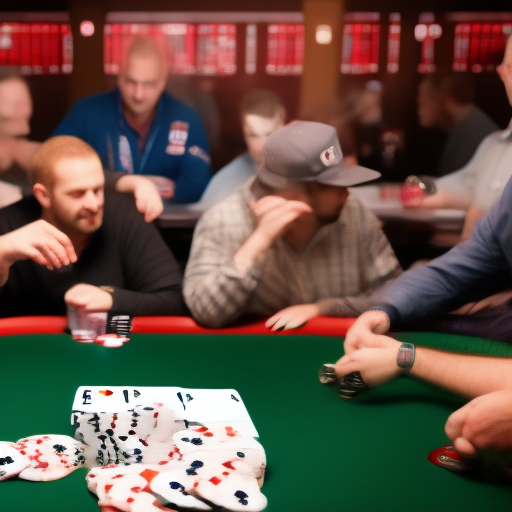Do you want to sharpen your game and become a poker-playing pro? Bluffing is a skill that may seem daunting, but there’s help out there if you know where to look. Poker-playing professionals have been perfecting their bluffing techniques for years, so why not tap into their expertise? You’ll learn all the tips and tricks from the pros who know the nuances of poker and understand the best ways to manipulate your opponents. In this article, find out why bluffing matters and learn how you can use the pros’ tips and tricks to master the art of the bluff.
1. Mastering The Art Of Bluffing
Picture this: you’re playing poker with your friends and you’ve got a terrible hand. All of a sudden, you start feeling confident and making bold moves. Your friends start to get nervous and before you know it, you’ve bluff them into folding their hands, winning the pot. How did you do it? It’s simple, you mastered the art of bluffing.
Bluffing is a crucial part of poker and other card games. It’s the act of making your opponents believe that you have a better hand than you actually do. But bluffing isn’t just about poker. It’s a skill that can be used in many areas of life – negotiations, job interviews, and even social situations. The key to is all about confidence and the ability to read and manipulate people. Knowing when to bluff and when to fold is crucial. Remember, even the best bluffers get caught sometimes. But with practice, anyone can learn to be a successful bluffer. So next time you’re in a tricky situation, channel your inner poker player, bluff your way through it, and come out on top.
2. Benefits Of Bluffing Strategies
Bluffing is a strategy that can be incredibly beneficial when it comes to many aspects of life, including business negotiations, poker games, and even personal relationships. By bluffing strategically, you can gain leverage and influence in a way that would be impossible otherwise. Some of the key include:
- Building confidence: When you bluff successfully, it can be a huge boost to your confidence. You’ll feel more in control of the situation, and you’ll be more likely to take risks in the future. This can be especially helpful in business negotiations, where confidence can often make or break a deal.
- Getting what you want: Bluffing can help you achieve your goals in a variety of situations. For example, if you’re playing poker and you have a weak hand, you can bluff your opponents into thinking you have a strong hand and get them to fold. Similarly, in business negotiations, you can bluff your way into getting a better deal than you might have otherwise.
Of course, it’s important to use bluffing strategies carefully and ethically. You don’t want to deceive people in a way that damages your reputation or relationships. However, when used appropriately, bluffing can be an incredibly valuable tool. So, figure out what you’re trying to accomplish, consider the risks and rewards, and give bluffing a try – you might be surprised at how effective it can be!
3. Types Of Bluffs To Use During A Poker Game
There are multiple types of bluffs that poker players use to deceive their opponents and win the pot. Here are some of the most used bluff techniques:
- Semi-Bluff: This type of bluff involves betting on a hand that is not the best right now but has the potential to become the strongest hand in later rounds. For instance, if you have a hand with a flush draw, you might go for a semi-bluff to intimidate your opponents.
- Stone-Cold Bluff: This is the kind of bluff where you bet on a hand with no chances of getting better in the later rounds. It is a risky move, but if you can read your opponents, it can be very profitable.
- Slow-Play: In a slow-play bluff, the player downplays the strength of their hand and waits for others to make strong bets before they start raising. This strategy aims to make opponents think their hand is more powerful than yours.
As a poker player, being able to master these bluff techniques is vital. But at the same time, it is essential to remember that overusing any of these techniques can quickly reveal your strategy and make it less effective. It is up to you to choose the best time, position, and opponent to use each bluff. So, practice, analyze your opponents’ behavior, and take calculated risks to win the pot. Don’t be discouraged if you’re just starting out. Bluffing is a skill that can take time to develop and perfect, but it’s also a skill that can help you become one of the greats and give you the edge you need to win. So go all in – and become your best poker self.